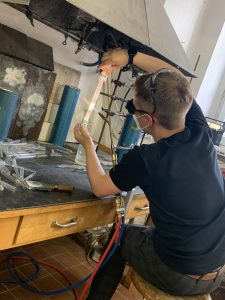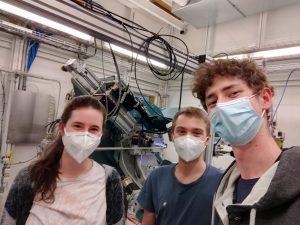
Alexander has won the Lieselotte Templeton Prize in 2022 for his outstanding bachelor thesis with the topic Synthesis, crystal structure analysis, and measurement of physical properties of the binary beryllium pnictides BePn2 (Pn = P, As, Sb) under application of X-ray and electron microscopic techniques. After Alexander graduated from high school with a mathematical-scientific specialization, he was faced with the decision whether to study physics or chemistry. With crystallography and solid-state chemistry, he now has landed somewhere in between. Alexander has been working for more than two years in the group of Prof. Dr. Oliver Oeckler at the University Leipzig on a research project on binary beryllium projects, which finally lead to his thesis.
In addition to all the science, he is particularly interested in music as a trumpet player in different ensembles.
Please give us a brief overview of your work.

In our research work, to which also my bachelor thesis belongs, we mainly focus on the structure elucidation of binary main group compounds between beryllium and an element of group 15. Since these compounds are mostly obtained as a microcrystalline powder and are hardly characterizable, their structures are partially not known so far and require modern structure analysis methods like diffraction with microfocused synchrotron radiation or electron crystallography. As a result of our work, we were able to elucidate the structures of BeSb2 as well as of the isotypic compounds BeAs2 and BeP2. While BeSb2 represents a Grimm Sommerfeld compound with Zintl polyanions, BeAs2 and BeP2 are classical Order Disorder structures with diffuse streaks in the diffraction pattern, which could be simulated by understanding the local structure. In further investigations, we will focus on the physical properties of these compounds in combination with ab initio Density Functional Theory (DFT) calculations as well as on additional structures in this compound class like other polymorphs or substitution variants.
“Synthesis, analysis and physical proiperties…” That’s very broad scope. Which aspect of your work did you like the most?

What I value most about my work is the collaboration with other competent people, which were or are part of our research project. We were supported by the whole working group and Prof. Oeckler himself. Particularly enjoyable is the pleasant interpersonal atmosphere, which only makes a successful scientific collaboration possible.
Luckily, the main part of the work deals with complex structure analysis based on modern methods, which I am scientifically most interested in. I had the opportunity to leave my usual environment in Leipzig, gain experience, and meet new people. This comprises both synchrotron measurements at the ESRF in Grenoble and at DESY in Hamburg as well as the IUCr conference in Prague last year, where I could present first results [1]. This allowed me to create a working atmosphere, in which it does not get boring, and I enjoy producing more results.
Who proposed you for the prize? Your professor? You yourself?
I was proposed for the prize by Prof. Oeckler, who has been a member of the DGK for years and therefore knew that the prize would be awarded for the first time. I am delighted to be the recipient of the first Lieselotte Templeton price and thank the awards committee for the honoring and all the others who have supported me on the way to this award!
Contact
Alexander Feige
Institute for Mineralogy, Crystallography and Materials Science
Faculty of Chemistry and Mineralogy
Leipzig University
Scharnhorstraße 20, 04275 Leipzig